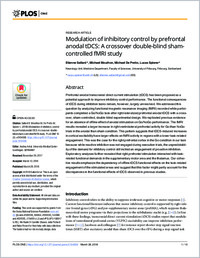Modulation of inhibitory control by prefrontal anodal tDCS: A crossover double-blind sham-controlled fMRI study
- Sallard, Etienne Neurology Unit, Medicine Department, Faculty of Sciences, University of Fribourg, Switzerland
- Mouthon, Michaël Neurology Unit, Medicine Department, Faculty of Sciences, University of Fribourg, Switzerland
- De Pretto, Michael Neurology Unit, Medicine Department, Faculty of Sciences, University of Fribourg, Switzerland
- Spierer, Lucas Neurology Unit, Medicine Department, Faculty of Sciences, University of Fribourg, Switzerland
-
28.03.2018
Published in:
- PLOS ONE. - 2018, vol. 13, no. 3, p. e0194936
English
Prefrontal anodal transcranial direct current stimulation (tDCS) has been proposed as a potential approach to improve inhibitory control performance. The functional consequences of tDCS during inhibition tasks remain, however, largely unresolved. We addressed this question by analyzing functional magnetic resonance imaging (fMRI) recorded while participants completed a Go/NoGo task after right-lateralized prefrontal anodal tDCS with a crossover, sham-controlled, double-blind experimental design. We replicated previous evidence for an absence of offline effect of anodal stimulation on Go/NoGo performance. The fMRI results revealed a larger increase in right ventrolateral prefrontal activity for Go than NoGo trials in the anodal than sham condition. This pattern suggests that tDCS-induced increases in cortical excitability have larger effects on fMRI activity in regions with a lower task-related engagement. This was the case for the right prefrontal cortex in the Go condition in our task because while reactive inhibition was not engaged during execution trials, the unpredictability of the demand for inhibitory control still incited an engagement of proactive inhibition. Exploratory analyses further revealed that right prefrontal stimulation interacted with task-related functional demands in the supplementary motor area and the thalamus. Our collective results emphasize the dependency of offline tDCS functional effects on the task-related engagement of the stimulated areas and suggest that this factor might partly account for the discrepancies in the functional effects of tDCS observed in previous studies.
- Faculty
- Faculté des sciences et de médecine
- Department
- Médecine 3ème année
- Language
-
- English
- Classification
- Biological sciences
- License
-
License undefined
- Identifiers
-
- RERO DOC 309063
- DOI 10.1371/journal.pone.0194936
- Persistent URL
- https://folia.unifr.ch/unifr/documents/306618
Statistics
Document views: 115
File downloads:
- pdf: 224
